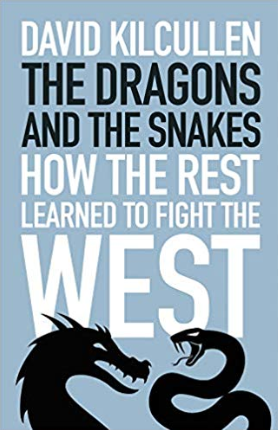
Understanding the West’s foes


The Dragons do an expose of why state militaries even conventional armed forces of the US, the former Soviet Union and China are ill-suited to modern forms of warfare.
Snake, bands of terrorists, are the characters who succeeded in the aftermath of the collapse of communism and are smarter than the dragons who try to fight them, reaching a level of precision better than state-based militaries.
David Kilcullen was a strategic adviser to General David Petraeus, who overcame the Sunni insurgency in Iraq and also has served as a counter-insurgency specialist with Australian forces in East Timor and Afghanistan.
In 1993, a newly-appointed CIA director warned that Western powers night have “slain a large dragon with the fall of the USSR but now faced a bewildering variety of poisonous snakes. The US struggles in Iraq and Afghanistan and mastered new methods in response to hybrid and urban warfare, political manipulation and harnessing digital technology.
In the central theme of Dragons and Snakes, there is a Darwinian dialectic between the mighty dragon and the snakes that seek to subvert and outflank them, as each has learnt from the other with the weakest disappearing.
Sometimes when snake transforms into dragons, as ISIS did in Iraq, initial success contained seeds of destruction. “By operating at scale in the open with tanks and large combat units seeking to seize and hold cities, Islamic state shifted the conflict to exactly the conventional forms of open warfare where Western forces excelled” according to Kilcullen.
In Lebanon, the Shia group Hizbollah managed the transition more successfully, deploying a spectrum of coercive, administrative and persuasive tools.”
The book also details the resurrection of two dragons that were wounded- but far from dead – in 1991. Vladimir Putin’s Russia has downsized the bulky military formations to more dexterous battalion tactical groups (BTG).
This was a result of fear of western encroachments following the west’s failure to uphold US secretary of state James Baker’s assurance in 1990 to Soviet leader Mikhail Gorbachev that NATO in exchange for German unification would not shift one inch eastward from its present position. The resulting BTGs have been effective in Georgia, Ukraine, and Syria.
Kilcullen mentions Russia’s specialty and calls its “liminality” – non-military tactics where the actor seeks to remain to blow the enemy’s detection threshold which includes hackers, cyber militias, relationships with organised crime networks and propaganda tools” and alliances with extremists or separatist groups.
While the West considers even those involved in presidential campaigns, non-military measures ways of avoiding war, Russia considers them part of the war itself.”
The Chinese dragon is harder to predict. Should the west worry about communist princelings acquiring real estate in San Diego (home to one of the largest US naval bases), Faslane in Scotland home to the UK nuclear submarines or the Australian port of Darwin in which China has a controlling interest.
The best assurance of survival lies not in maintaining mythical dragons but in the Darwinian adaptability of snakes.
The Dragons and the Snakes How the Rest Learned to Fight the West by David Kilcullen, Hurst £20, 304 pages.
